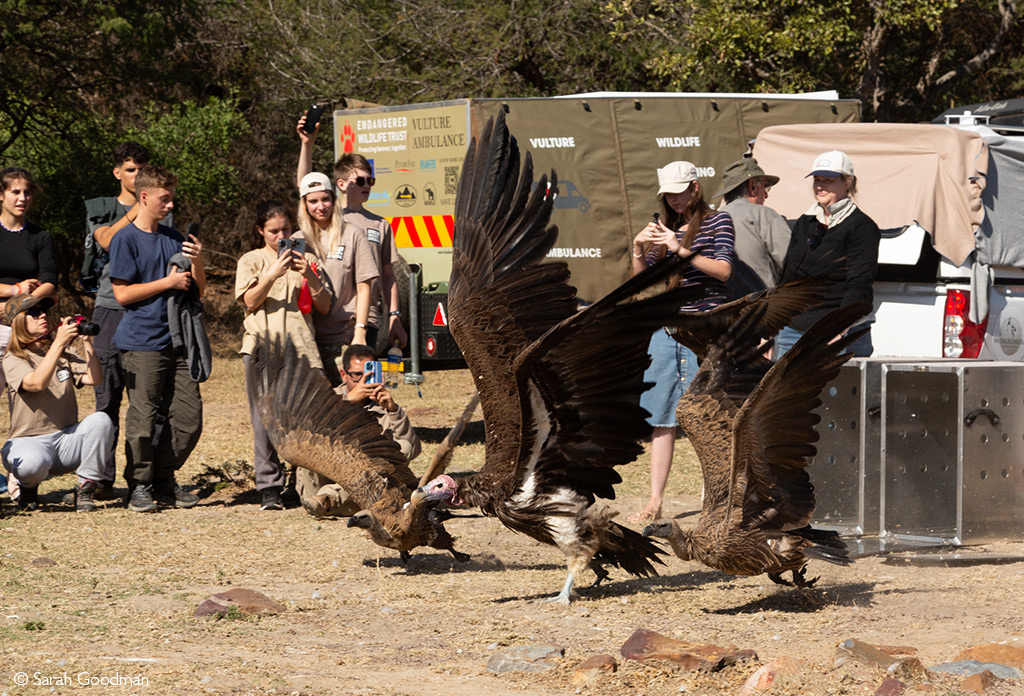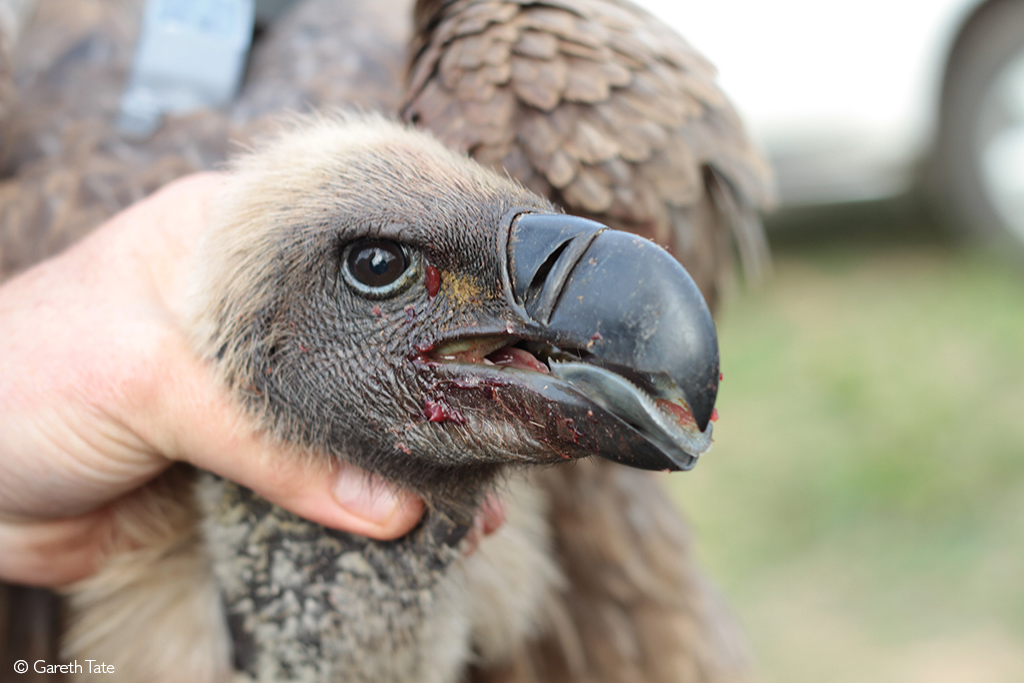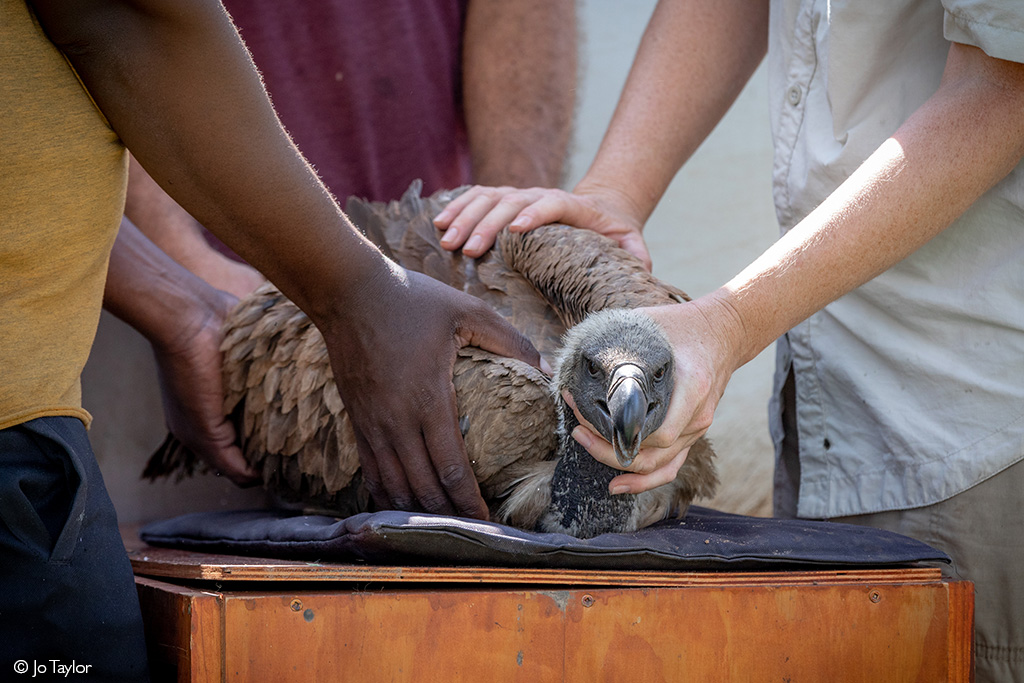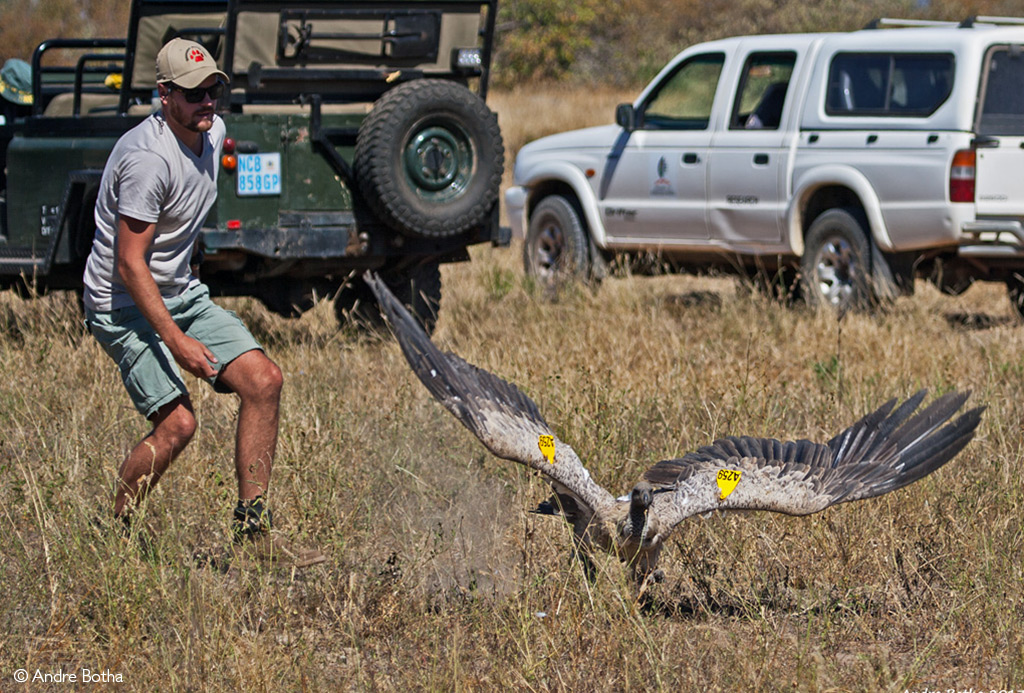
On a bright clear day in July, just outside the small bushveld town of Hoedspruit, members of the public (including several members of teamAG) gathered to watch the release of rehabilitated vultures back into the wild. It was a joyous moment for the crowds as 10 birds (six white-backed, one lappet-faced, one hooded, and two Cape vultures) launched themselves from their crates and took to the skies. But these vultures were the lucky ones – eight of these had survived a mass poisoning event that claimed the lives of one bateleur, four lions (including three cubs), and 45 vultures.
The surviving vultures owe their lives to the concerted efforts of the Endangered Wildlife Trust (EWT) Birds of Prey Programme Lowveld team. On the 16th of June, 2023, John Davies and Dr Lindy Thomson responded to a report of a poisoning incident in the Greater Kruger area. The first two white-backed vultures were found in grave condition just before darkness descended and rushed to Moholoholo Wildlife Rehabilitation Centre (Moholoholo). The next day, the rescue team (now supplemented by SANParks rangers, SANParks Honorary Rangers and veterinary professionals) continued the search over several gruelling hours, scouring the area and carrying critically ill birds back to the EWT’s specialised Vulture Ambulance. Ultimately, six white-backed vultures, one lappet-faced vulture and one hooded vulture made it to Moholoholo to be rehabilitated over the next two weeks.

Vultures in crisis
Poisoning incidents such as this are devastatingly common, especially in high-risk areas such as the Great Limpopo Transfrontier Conservation Area (which includes the Kruger National Park and surrounding reserves). Since January 2019, 796 vultures have died in this region.
Vultures in Africa are in crisis. Since the early 2000s, populations of most species have plummeted, with some populations declining as much as 97% in just a few short decades and many on the verge of collapse. Though habitat loss and fragmentation, collisions with powerlines and wind turbines, nesting disruption, and lead poisoning (from lead-based ammunition used in hunting and culling) are all contributing causes, mass poisoning events have the most destructive consequences for local populations. Depending on the time frame and the size of the poisoned carcass, one such incident can claim the lives of hundreds of vultures at a time. To date, the largest known mass vulture mortality event occurred in Guinea-Bissau in 2020 and resulted in the deaths of over 2,000 vultures.
The poisonings are usually motivated by the trade of vulture parts for ritual and religious use (or bushmeat consumption, depending on the region). Across sub-Saharan Africa, but especially in Southern and West Africa, vultures are valued for their use in traditional medicine. They are utilised to treat various physical and mental ailments and provide clairvoyant powers, good fortune, foresight and increased intelligence. The trade is supplied by poachers who lace carcasses with easily accessible agricultural pesticides such as Temik (aldicarb), a potent carbamate poison colloquially known as “Two Step” (so named for the two steps its victims take before they die). The approach is indiscriminate and frequently results in a massacre of other scavengers and predators.
Apart from deliberate poisoning, vultures may also be incidental victims of poison-laced carcasses meant to target land-based livestock predators such as jackals or lions. Furthermore, the rapid increase in elephant and rhino poaching has also increased the risk to vultures. Poachers have been known to poison the carcasses to kill vultures to avoid alerting authorities to their activities.


Vultures are long-lived birds that are slow to mature and breed. They are fascinating to witness while on safari (let us help you see them in the wild), and each breeding pair is estimated to raise a single offspring to fledging once every one to two years. With mass poisoning incidents on the rise and vulture populations in steep decline, scientists have warned that many of Africa’s vulture species could be extinct within the next few decades. In response to these alarm bells, the IUCN Vulture Specialist Group prompted a reassessment of the conservation status of several species. The severity of their findings is summarised in the table below:
Threatened vulture species of Africa and their IUCN Red List conservation status in 2021
| Hooded vulture | Critically endangered (Least concern in 2006) |
| Ruppell’s Vulture | Critically endangered (Least concern in 2006) |
| White-backed vulture | Critically endangered (Least concern in 2006) |
| Cape vulture | Vulnerable |
| Lappet-faced vulture | Endangered (Vulnerable in 2006) |
| White-headed vulture | Critically endangered (Least concern in 2006) |
| Egyptian vulture | Endangered |
| Eurasian griffon vulture | Least concern (but with several African populations now locally extinct) |
| Lammergeier | Near-threatened (Least concern in 2006) |
The Vulture Ambulance
These mass poisoning events often occur in inaccessible areas far from rehabilitation centres. The birds that survive are invariably in critical condition and desperate need of emergency medical treatment. These realities prompted the EWT (with the assistance of various donors) to create a world-first Vulture Ambulance designed explicitly for mass poisoning events. The ambulance includes a mobile clinic, first-aid station and all equipment necessary to stabilise poisoned survivors. The customised crates can accommodate up to 20 birds at a time and allow easy access to each patient without disturbing neighbouring birds. They can even remain in the ambulance overnight when rescue efforts prove time-consuming.
The ambulance had been strategically placed in the high-risk Great Limpopo Transfrontier Conservation Area and proved effective in the latest poisoning event. The EWT hopes to develop more ambulance units to increase the number of birds that survive these catastrophic events.

How can you help?
Vultures play a vital ecological role in Africa and are essential to maintaining healthy ecosystems. As obligate scavengers, they rapidly remove carcasses and substantially limit the spread of disease. Their absence will have dire consequences for other wildlife and human health throughout the continent.
The EWT and other conservation organisations should be lauded for their efforts to protect the continent’s remaining vultures. It is a labour-intensive, emotionally draining and extremely costly process and support from the general public is always greatly valued (and indispensable).

Further reading
For the shocking scale of vulture poisoning over recent years, search our stories page for “vultures.”
Read all there is to know about the Old World vultures here.
To comment on this story: Login (or sign up) to our app here - it's a troll-free safe place 🙂.![]()





